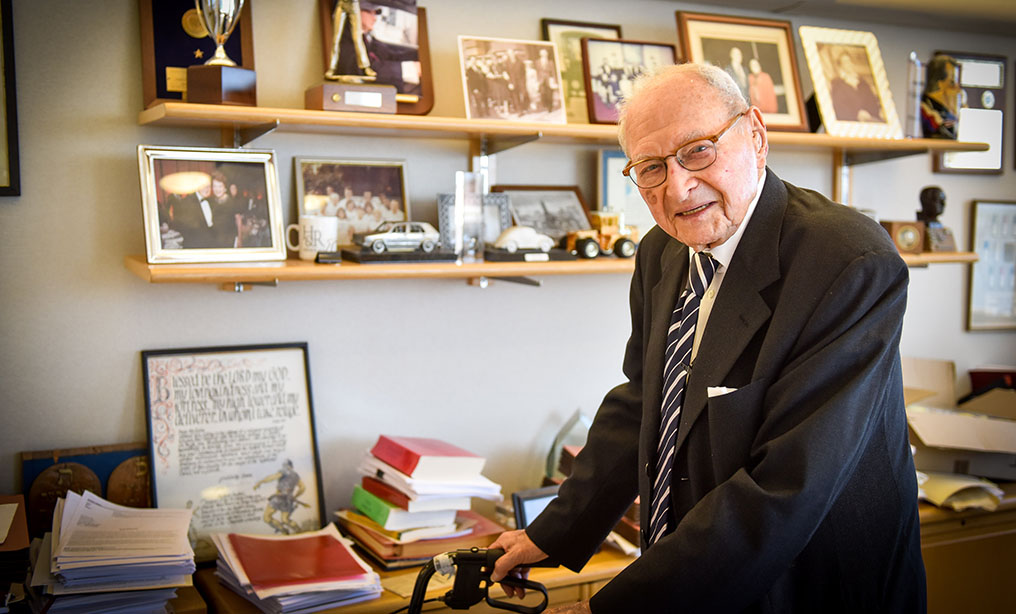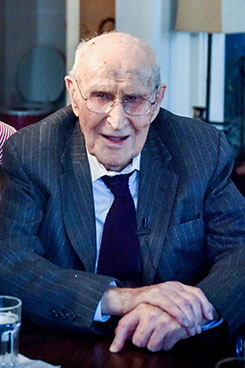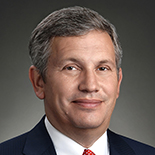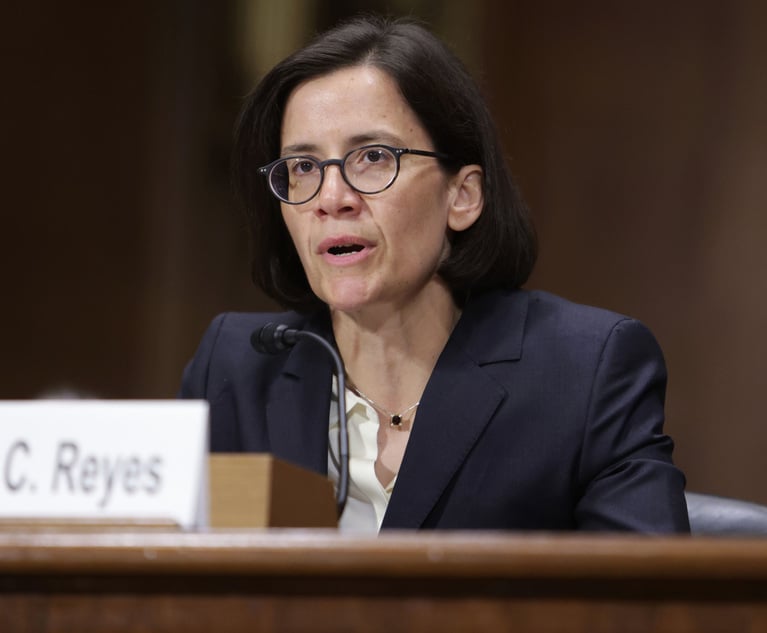Mandatory Retirement Policies Fading, but Tensions Remain
"It's like going to high school when the seniors never graduate and the seniors are the partners," said Terrence Tarver, a personal injury lawyer in New York.
February 04, 2019 at 11:29 AM
5 minute read
 Herb Rubin is a 100-year-old attorney who still practices in New York. (Photo: David Handschuh/ALM)
Herb Rubin is a 100-year-old attorney who still practices in New York. (Photo: David Handschuh/ALM)
When Herb Rubin's partner died, he was recruited by a big law firm with a mandatory retirement age. Rubin, 100, the name partner at Herzfeld & Rubin in New York, is glad that he turned that offer down. Otherwise, he would have been forced to retire 35 years ago.
Paul Weiss partner Mordie Rochlin, 106, did retire 35 years ago when he reached the firm's mandatory retirement age of 70. But Rochlin couldn't imagine life without the firm, so he never actually left.
 Mordie Rochlin, who is 106, still has an office and an assistant at Paul Weiss 35 years after his retirement. (Photo: David Handschuh/ALM)
Mordie Rochlin, who is 106, still has an office and an assistant at Paul Weiss 35 years after his retirement. (Photo: David Handschuh/ALM)“As you might imagine, some of my partners welcome retirement and may even choose to retire before their mandatory retirement age is hit,” said Paul Weiss chairman Brad Karp. “Others strongly resist retirement and would prefer to work well beyond their designated retirement age. They'll point to my partner Mordie Rochlin, who still comes to the office at age 106.”
Nearly 40 percent of law firms had mandatory retirement ages 15 years ago, according to a study conducted by Altman Weil for the American Bar Foundation. But, when The American Lawyer surveyed 68 firms in 2016, only 16 mostly elite firms still had an age cutoff. In the past couple of years, law firm leaders have acknowledged making exceptions for lawyers who bring in the most business.
While policies differ, one thing is consistent across the industry: Older lawyers who want to stay resent being pushed out, but younger lawyers don't think their elders are turning over the business soon enough. Terrence Tarver, 39, a personal injury lawyer who chairs the young lawyers section at the New York State Bar Association, objects to mandatory retirement policies but understands why they're popular among his peers.
“It's like going to high school when the seniors never graduate and the seniors are the partners,” said Tarver who stressed he wasn't speaking for the state bar.
A third of respondents to ALM Intelligence's 2016 law firm leaders survey said that senior partners are keeping work that they should have passed on to the next generation, and more than 60 percent said some partners are staying on too long.
Eric Seeger, a principal at Altman Weil who specializes in succession planning, agrees that there is a generational divide.
“Anecdotally, it's consistent with my experience that younger lawyers tend to want the senior lawyers to move on, and the senior lawyers resent being asked to leave,” Seeger said.
Former Chief Judge Jonathan Lippman, who reluctantly left the Court of Appeals when he hit the mandatory retirement age of 70 in 2015, was at the annual meeting of the state bar in January to hand out pro bono awards named in his honor. The awards were given by the senior lawyers section, which had gathered to discuss how senior lawyers can lead productive professional lives well into old age.
“I think the answer is we have to as a profession place more of a value on lawyers' expertise,” said Lippman, who was a proponent of a failed 2013 ballot proposition to raise the age limit for judges. “There is a tendency in our society to downplay wisdom and experience.”
Henry “Hank” Greenberg, a shareholder at Greenberg & Traurig and president-elect of the state bar, said law firm mandatory retirement policies should be eliminated and the retirement age for judges raised.
 Henry Greenberg, president-elect of the NYSBA
Henry Greenberg, president-elect of the NYSBA“In this room, the talent would take us to Mars and back,” he told the senior lawyers section.
Often, firms without retirement policies benefit from that talent.
Prominent bankruptcy attorney Richard Levin, a primary author of the 1978 U.S. Bankruptcy Code, made no secret of the fact that he left Cravath, Swaine & Moore for Jenner & Block in 2015 because he would have had to retire the following year at the age of 65.
“You lose a lot of talent with mandatory retirement,” he said in an interview Monday. “The real value is in the years of experience, and you can't bill for that by the tenths of an hour.”
Luise Barrack, managing member of Rosenberg & Estis, said her firm was happy to have Neil Underberg, a prominent commercial real estate attorney who was forced into mandatory retirement, work at the firm until shortly before his death at 88. “We did not terminate him at 88; he terminated us,” she said.
The debate over mandatory retirement has been waged for quite some time, and, with people living longer, healthier lives, it shows no sign of abating.
Mark Zauderer, name partner in Ganfer, Shore, Leeds & Zauderer, chaired the special committee on age discrimination in the profession for the state bar way back in 2007. In a strongly-worded report, the committee recommended that mandatory retirement policies be scrapped.
“Our argument was much of the objection to doing away with mandatory retirement was based on a false premise that there was a finite pie,” he said. “Keeping on people who wanted to work expanded the pie and created value to the firm.”
This content has been archived. It is available through our partners, LexisNexis® and Bloomberg Law.
To view this content, please continue to their sites.
Not a Lexis Subscriber?
Subscribe Now
Not a Bloomberg Law Subscriber?
Subscribe Now
NOT FOR REPRINT
© 2025 ALM Global, LLC, All Rights Reserved. Request academic re-use from www.copyright.com. All other uses, submit a request to [email protected]. For more information visit Asset & Logo Licensing.
You Might Like
View All
Justified Termination Does Not Bar Associate Attorney From Unemployment Benefits, State Appellate Court Rules
5 minute read
Florida Law Schools Are Seeing a Bump in Applications for 2025, After Recent Declines at Flagship Schools
3 minute read
Federal Judge Warns of 'Serious Sanctions' on FDIC Over Document Retention
3 minute read
Hogan Lovells, Jenner & Block Challenge Trump EOs Impacting Gender-Affirming Care
3 minute readTrending Stories
- 1NY No-Fault Insurance Adopts Worker’s Compensation Fee Schedule
- 2With AI Expected to Be a Focus This Year, What Changes Can Midsize Firms Expect?
- 3Dissenter Blasts 4th Circuit Majority Decision Upholding Meta's Section 230 Defense
- 4NBA Players Association Finds Its New GC in Warriors Front Office
- 5DC Circuit Keeps Docs in Judge Newman's Misconduct Proceedings Sealed
Who Got The Work
J. Brugh Lower of Gibbons has entered an appearance for industrial equipment supplier Devco Corporation in a pending trademark infringement lawsuit. The suit, accusing the defendant of selling knock-off Graco products, was filed Dec. 18 in New Jersey District Court by Rivkin Radler on behalf of Graco Inc. and Graco Minnesota. The case, assigned to U.S. District Judge Zahid N. Quraishi, is 3:24-cv-11294, Graco Inc. et al v. Devco Corporation.
Who Got The Work
Rebecca Maller-Stein and Kent A. Yalowitz of Arnold & Porter Kaye Scholer have entered their appearances for Hanaco Venture Capital and its executives, Lior Prosor and David Frankel, in a pending securities lawsuit. The action, filed on Dec. 24 in New York Southern District Court by Zell, Aron & Co. on behalf of Goldeneye Advisors, accuses the defendants of negligently and fraudulently managing the plaintiff's $1 million investment. The case, assigned to U.S. District Judge Vernon S. Broderick, is 1:24-cv-09918, Goldeneye Advisors, LLC v. Hanaco Venture Capital, Ltd. et al.
Who Got The Work
Attorneys from A&O Shearman has stepped in as defense counsel for Toronto-Dominion Bank and other defendants in a pending securities class action. The suit, filed Dec. 11 in New York Southern District Court by Bleichmar Fonti & Auld, accuses the defendants of concealing the bank's 'pervasive' deficiencies in regards to its compliance with the Bank Secrecy Act and the quality of its anti-money laundering controls. The case, assigned to U.S. District Judge Arun Subramanian, is 1:24-cv-09445, Gonzalez v. The Toronto-Dominion Bank et al.
Who Got The Work
Crown Castle International, a Pennsylvania company providing shared communications infrastructure, has turned to Luke D. Wolf of Gordon Rees Scully Mansukhani to fend off a pending breach-of-contract lawsuit. The court action, filed Nov. 25 in Michigan Eastern District Court by Hooper Hathaway PC on behalf of The Town Residences LLC, accuses Crown Castle of failing to transfer approximately $30,000 in utility payments from T-Mobile in breach of a roof-top lease and assignment agreement. The case, assigned to U.S. District Judge Susan K. Declercq, is 2:24-cv-13131, The Town Residences LLC v. T-Mobile US, Inc. et al.
Who Got The Work
Wilfred P. Coronato and Daniel M. Schwartz of McCarter & English have stepped in as defense counsel to Electrolux Home Products Inc. in a pending product liability lawsuit. The court action, filed Nov. 26 in New York Eastern District Court by Poulos Lopiccolo PC and Nagel Rice LLP on behalf of David Stern, alleges that the defendant's refrigerators’ drawers and shelving repeatedly break and fall apart within months after purchase. The case, assigned to U.S. District Judge Joan M. Azrack, is 2:24-cv-08204, Stern v. Electrolux Home Products, Inc.
Featured Firms
Law Offices of Gary Martin Hays & Associates, P.C.
(470) 294-1674
Law Offices of Mark E. Salomone
(857) 444-6468
Smith & Hassler
(713) 739-1250








